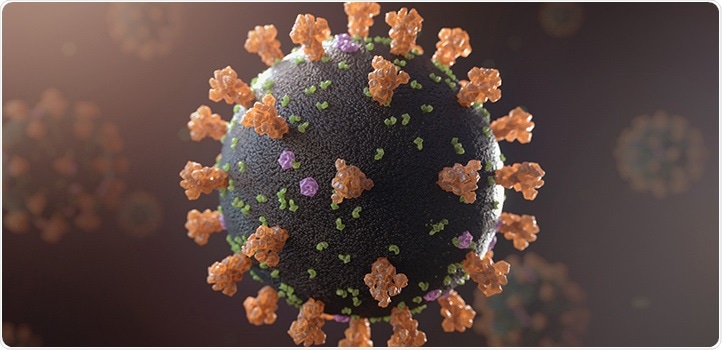In clinical settings, insights into similarities between COVID-19 and SARS inflammation could be very helpful. A protein found in viruses that are responsible for causing SARS and COVID-19 infections is virtually identical.

This artistic representation of a SARS-CoV-2 virus shows the membrane protein (green), the envelope protein (purple), and the characteristic spike protein (orange). Image Credit: © 2020 KAUST; Xavier Pita.
Scientists have proposed that if COVID-19 is tested with FDA-approved drugs, which have already been tested in SARS-infected mice, it could benefit COVID-19 patients who are suffering from severe respiratory symptoms.
The discovery was a joint effort of research teams from King Abdullah University of Science and Technology (KAUST) after a comparison of Betacoronavirus genomes.
We have long-standing expertise in analyzing genomic data at KAUST’s Computational Bioscience Research Center.”
Takashi Gojobori, Molecular Biologist, King Abdullah University of Science and Technology
Gojobori, Carlos M. Duarte, and a research team compared the genomes of a total of 24 Betacoronaviruses, such as four SARS-CoV-2 viruses, which are responsible for causing the COVID-19 infection. While two of the viruses were sequenced in the United States, the other two pathogens were sequenced in China.
SARS-CoV-2 appears to have recently evolved from other related Betacoronaviruses, such as the ones causing SARS and Middle East respiratory syndrome (MERS). We wanted to understand the genetic make up of SARS-CoV-2. Seeing what has changed might help find ways to detect the virus and understand its rapid spread.”
Intikhab Alam, Study First Author, King Abdullah University of Science and Technology
Alam continued, “Seeing what remains conserved between these viruses might help predict if therapeutic approaches developed for other Betacoronaviruses could work on SARS-CoV-2.”
The researchers made genomic comparisons and then performed structural analyses. They observed that a tiny protein extending over the membrane of virus, known as envelope protein E, is virtually identical in the SARS virus, also known as SARS-CoV-1, and SARS-CoV-2.
A molecular element of this protein in the SARS virus helps activate the discharge of inflammation-causing substances in its host. Such an inflammatory reaction causes the accumulation of fluids in the lungs, leading to difficulties in breathing—a condition known as acute respiratory distress syndrome.
Researchers focused on the SARS virus have identified that this kind of reaction can be blocked in mice by using FDA-approved drugs.
Drugs that inhibit the envelope protein E of previous SARS viruses should also block the protein in COVID-19. Even though these drugs won’t stop the virus from spreading, we hope they could attenuate or prevent acute respiratory distress syndrome and help save lives.”
Intikhab Alam, Study First Author, King Abdullah University of Science and Technology
Source:
Journal reference:
Alam, I., et al. (2020) Functional Pangenome Analysis Shows Key Features of E Protein Are Preserved in SARS and SARS-CoV-2. Frontiers in Cellular and Infection Microbiology. doi.org/10.3389/fcimb.2020.00405.